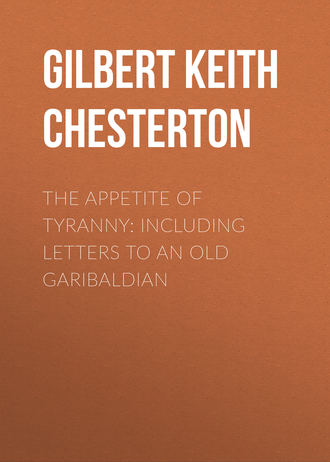
Гилберт Кит Честертон
The Appetite of Tyranny: Including Letters to an Old Garibaldian
It is plain that the promise, or extension of responsibility through time, is what chiefly distinguishes us, I will not say from savages, but from brutes and reptiles. This was noted by the shrewdness of the Old Testament, when it summed up the dark irresponsible enormity of Leviathan in the words "Will he make a pact with thee?" The promise, like the wheel, is unknown in Nature: and is the first mark of man. Referring only to human civilisation it may be said with seriousness, that in the beginning was the Word. The vow is to the man what the song is to the bird, or the bark to the dog; his voice, whereby he is known. Just as a man who cannot keep an appointment is not fit even to fight a duel, so the man who cannot keep an appointment with himself is not sane enough even for suicide. It is not easy to mention anything on which the enormous apparatus of human life can be said to depend. But if it depends on anything, it is on this frail cord, flung from the forgotten hills of yesterday to the invisible mountains of to-morrow. On that solitary string hangs everything from Armageddon to an almanac, from a successful revolution to a return ticket. On that solitary string the Barbarian is hacking heavily, with a sabre which is fortunately blunt.
Any one can see this well enough, merely by reading the last negotiations between London and Berlin. The Prussians had made a new discovery in international politics: that it may often be convenient to make a promise; and yet curiously inconvenient to keep it. They were charmed, in their simple way, with this scientific discovery, and desired to communicate it to the world. They therefore promised England a promise, on condition that she broke a promise, and on the implied condition that the new promise might be broken as easily as the old one. To the profound astonishment of Prussia, this reasonable offer was refused! I believe that the astonishment of Prussia was quite sincere. That is what I mean when I say that the Barbarian is trying to cut away that cord of honesty and clear record, on which hangs all that men have made.
The friends of the German cause have complained that Asiatics and Africans upon the very verge of savagery have been brought against them from India and Algiers. And, in ordinary circumstances, I should sympathise with such a complaint made by a European people. But the circumstances are not ordinary. Here, again, the quite unique barbarism of Prussia goes deeper than what we call barbarities. About mere barbarities, it is true, the Turco and the Sikh would have a very good reply to the superior Teuton. The general and just reason for not using non-European tribes against Europeans is that given by Chatham against the use of the Red Indian: that such allies might do very diabolical things. But the poor Turco might not unreasonably ask, after a weekend in Belgium, what more diabolical things he could do than the highly cultured Germans were doing themselves. Nevertheless, as I say, the justification of any extra-European aid goes deeper than any such details. It rests upon the fact that even other civilisations, even much lower civilisations, even remote and repulsive civilisations, depend as much as our own on this primary principle on which the super-morality of Potsdam declares open War. Even savages promise things; and respect those who keep their promises. Even Orientals write things down: and though they write them from right to left, they know the importance of a scrap of paper. Many merchants will tell you that the word of the sinister and almost unhuman Chinaman is often as good as his bond: and it was amid palm trees and Syrian pavilions that the great utterance opened the tabernacle, to him that sweareth to his hurt and changeth not. There is doubtless a dense labyrinth of duplicity in the East, and perhaps more guile in the individual Asiatic than in the individual German. But we are not talking of the violations of human morality in various parts of the world. We are talking about a new and inhuman morality, which denies altogether the day of obligation. The Prussians have been told by their literary men that everything depends upon Mood: and by their politicians that all arrangements dissolve before "necessity." That is the importance of the German Chancellor's phrase. He did not allege some special excuse in the case of Belgium, which might make it seem an exception that proved the rule. He distinctly argued, as on a principle applicable to other cases, that victory was a necessity and honour was a scrap of paper. And it is evident that the half-educated Prussian imagination really cannot get any further than this. It cannot see that if everybody's action were entirely incalculable from hour to hour, it would not only be the end of all promises, but the end of all projects. In not being able to see that, the Berlin philosopher is really on a lower mental level than the Arab who respects the salt, or the Brahmin who preserves the caste. And in this quarrel we have a right to come with scimitars as well as sabres, with bows as well as rifles, with assegai and tomahawk and boomerang, because there is in all these at least a seed of civilisation that these intellectual anarchists would kill. And if they should find us in our last stand girt with such strange swords and following unfamiliar ensigns, and ask us for what we fight in so singular a company, we shall know what to reply: "We fight for the trust and for the tryst; for fixed memories and the possible meeting of men; for all that makes life anything but an uncontrollable nightmare. We fight for the long arm of honour and remembrance; for all that can lift a man above the quicksands of his moods, and give him the mastery of time."
II
THE REFUSAL OF RECIPROCITY
In the last summary I suggested that Barbarism, as we mean it, is not mere ignorance or even mere cruelty. It has a more precise sense, and means militant hostility to certain necessary human ideas. I took the case of the vow or the contract, which Prussian intellectualism would destroy. I urged that the Prussian is a spiritual Barbarian, because he is not bound by his own past, any more than a man in a dream. He avows that when he promised to respect a frontier on Monday, he did not foresee what he calls "the necessity" of not respecting it on Tuesday. In short, he is like a child, who at the end of all reasonable explanations and reminders of admitted arrangements, has no answer except "But I want to."
There is another idea in human arrangements so fundamental as to be forgotten; but now for the first time denied. It may be called the idea of reciprocity; or, in better English, of give and take. The Prussian appears to be quite intellectually incapable of this thought. He cannot, I think, conceive the idea that is the foundation of all comedy; that, in the eyes of the other man, he is only the other man. And if we carry this clue through the institutions of Prussianised Germany, we shall find how curiously his mind has been limited in the matter. The German differs from other patriots in the inability to understand patriotism. Other European peoples pity the Poles or the Welsh for their violated borders; but Germans pity only themselves. They might take forcible possession of the Severn or the Danube, of the Thames or the Tiber, of the Garry or the Garonne – and they would still be singing sadly about how fast and true stands the watch on Rhine; and what a shame it would be if any one took their own little river away from them. That is what I mean by not being reciprocal: and you will find it in all that they do: as in all that is done by savages.
Here, again, it is very necessary to avoid confusing this soul of the savage with mere savagery in the sense of brutality or butchery; in which the Greeks, the French and all the most civilised nations have indulged in hours of abnormal panic or revenge. Accusations of cruelty are generally mutual. But it is the point about the Prussian that with him nothing is mutual. The definition of the true savage does not concern itself even with how much more he hurts strangers or captives than do the other tribes of men. The definition of the true savage is that he laughs when he hurts you; and howls when you hurt him. This extraordinary inequality in the mind is in every act and word that comes from Berlin. For instance, no man of the world believes all he sees in the newspapers; and no journalist believes a quarter of it. We should, therefore, be quite ready in the ordinary way to take a great deal off the tales of German atrocities; to doubt this story or deny that. But there is one thing that we cannot doubt or deny: the seal and authority of the Emperor. In the Imperial proclamation the fact that certain "frightful" things have been done is admitted; and justified on the ground of their frightfulness. It was a military necessity to terrify the peaceful populations with something that was not civilised, something that was hardly human. Very well. That is an intelligible policy: and in that sense an intelligible argument. An army endangered by foreigners may do the most frightful things. But then we turn the next page of the Kaiser's public diary, and we find him writing to the President of the United States, to complain that the English are using Dum-dum bullets and violating various regulations of the Hague Conference. I pass for the present the question of whether there is a word of truth in these charges. I am content to gaze rapturously at the blinking eyes of the True, or Positive, Barbarian. I suppose he would be quite puzzled if we said that violating the Hague Conference was "a military necessity" to us; or that the rules of the Conference were only a scrap of paper. He would be quite pained if we said that Dum-dum bullets, "by their very frightfulness," would be very useful to keep conquered Germans in order. Do what he will, he cannot get outside the idea that he, because he is he and not you, is free to break the law; and also to appeal to the law. It is said that the Prussian officers play at a game called Kriegsspiel, or the War Game. But in truth they could not play at any game; for the essence of every game is that the rules are the same on both sides.
But taking every German institution in turn, the case is the same; and it is not a case of mere bloodshed or military bravado. The duel, for example, can legitimately be called a barbaric thing; but the word is here used in another sense. There are duels in Germany; but so there are in France, Italy, Belgium, and Spain; indeed, there are duels wherever there are dentists, newspapers, Turkish baths, time-tables, and all the curses of civilisation; except in England and a corner of America. You may happen to regard the duel as a historic relic of the more barbaric States on which these modern States were built. It might equally well be maintained that the duel is everywhere the sign of high civilisation; being the sign of its more delicate sense of honour, its more vulnerable vanity, or its greater dread of social disrepute. But whichever of the two views you take, you must concede that the essence of the duel is an armed equality. I should not, therefore, apply the word barbaric, as I am using it, to the duels of German officers, or even to the broadsword combats that are conventional among the German students. I do not see why a young Prussian should not have scars all over his face if he likes them; nay, they are often the redeeming points of interest on an otherwise somewhat unenlightening countenance. The duel may be defended; the sham duel may be defended.
What cannot be defended is something really peculiar to Prussia, of which we hear numberless stories, some of them certainly true. It might be called the one-sided duel. I mean the idea that there is some sort of dignity in drawing the sword upon a man who has not got a sword; a waiter, or a shop assistant, or even a schoolboy. One of the officers of the Kaiser in the affair at Saberne was found industriously hacking at a cripple. In all these matters I would avoid sentiment. We must not lose our tempers at the mere cruelty of the thing; but pursue the strict psychological distinction. Others besides German soldiers have slain the defenceless, for loot or lust or private malice, like any other murderer. The point is that nowhere else but in Prussian Germany is any theory of honour mixed up with such things; any more than with poisoning or picking pockets. No French, English, Italian or American gentleman would think he had in some way cleared his own character by sticking his sabre through some ridiculous greengrocer who had nothing in his hand but a cucumber. It would seem as if the word which is translated from the German as "honour" must really mean something quite different in German. It seems to mean something more like what we should call "prestige."
The fundamental fact, however, is the absence of the reciprocal idea. The Prussian is not sufficiently civilised for the duel. Even when he crosses swords with us his thoughts are not as our thoughts; when we both glorify war, we are glorifying different things. Our medals are wrought like his, but they do not mean the same thing; our regiments are cheered as his are, but the thought in the heart is not the same; the Iron Cross is on the bosom of his king, but it is not the sign of our God. For we, alas, follow our God with many relapses and self-contradictions, but he follows his very consistently. Through all the things that we have examined, the view of national boundaries, the view of military methods, the view of personal honour and self-defence, there runs in their case something of an atrocious simplicity; something too simple for us to understand: the idea that glory consists in holding the steel, and not in facing it.
If further examples were necessary, it would be easy to give hundreds of them. Let us leave, for the moment, the relation between man and man in the thing called the duel. Let us take the relation between man and woman, in that immortal duel which we call a marriage. Here again we shall find that other Christian civilisations aim at some kind of equality; even if the balance be irrational or dangerous. Thus, the two extremes of the treatment of women might be represented by what are called the respectable classes in America and in France. In America they choose the risk of comradeship; in France the compensation of courtesy. In America it is practically possible for any young gentleman to take any young lady for what he calls (I deeply regret to say) a joy-ride; but at least the man goes with the woman as much as the woman with the man. In France the young woman is protected like a nun while she is unmarried; but when she is a mother she is really a holy woman; and when she is a grandmother she is a holy terror. By both extremes the woman gets something back out of life. There is only one place where she gets little or nothing back; and that is the north of Germany. France and America aim alike at equality; America by similarity; France by dissimilarity. But North Germany does definitely aim at inequality. The woman stands up, with no more irritation than a butler; the man sits down, with no more embarrassment than a guest. This is the cool affirmation of inferiority, as in the case of the sabre and the tradesman. "Thou goest with women; forget not thy whip," said Nietzsche. It will be observed that he does not say "poker"; which might come more naturally to the mind of a more common or Christian wife-beater. But then a poker is a part of domesticity; and might be used by the wife as well as the husband. In fact, it often is. The sword and the whip are the weapons of a privileged caste.
Pass from the closest of all differences, that between husband and wife, to the most distant of all differences, that of the remote and unrelated races who have seldom seen each other's faces, and never been tinged with each other's blood. Here we still find the same unvarying Prussian principle. Any European might feel a genuine fear of the Yellow Peril; and many Englishmen, Frenchmen, and Russians have felt and expressed it. Many might say, and have said, that the Heathen Chinee is very heathen indeed; that if he ever advances against us he will trample and torture and utterly destroy, in a way that Eastern people do, but Western people do not. Nor do I doubt the German Emperor's sincerity when he sought to point out to us how abnormal and abominable such a nightmare campaign would be, supposing that it could ever come. But now comes the comic irony; which never fails to follow on the attempt of the Prussian to be philosophic. For the Kaiser, after explaining to his troops how important it was to avoid Eastern Barbarism, instantly commanded them to become Eastern Barbarians. He told them, in so many words, to be Huns: and leave nothing living or standing behind them. In fact, he frankly offered a new army corps of aboriginal Tartars to the Far East, within such time as it may take a bewildered Hanoverian to turn into a Tartar. Any one who has the painful habit of personal thought, will perceive here at once the non-reciprocal principle again. Boiled down to its bones of logic, it means simply this: "I am a German and you are a Chinaman. Therefore I, being a German, have a right to be a Chinaman. But you have no right to be a Chinaman; because you are only a Chinaman." This is probably the highest point to which the German culture has risen.
The principle here neglected, which may be called Mutuality by those who misunderstand and dislike the word Equality, does not offer so clear a distinction between the Prussian and the other peoples as did the first Prussian principle of an infinite and destructive opportunism; or, in other words, the principle of being unprincipled. Nor upon this second can one take up so obvious a position touching the other civilisations or semi-civilisations of the world. Some idea of oath and bond there is in the rudest tribes, in the darkest continents. But it might be maintained, of the more delicate and imaginative element of reciprocity, that a cannibal in Borneo understands it almost as little as a professor in Berlin. A narrow and one-sided seriousness is the fault of barbarians all over the world. This may have been the meaning, for aught I know, of the one eye of the Cyclops: that the Barbarian cannot see round things or look at them from two points of view; and thus becomes a blind beast and an eater of men. Certainly there can be no better summary of the savage than this, which as we have seen, unfits him for the duel. He is the man who cannot love – no, nor even hate – his neighbour as himself.







